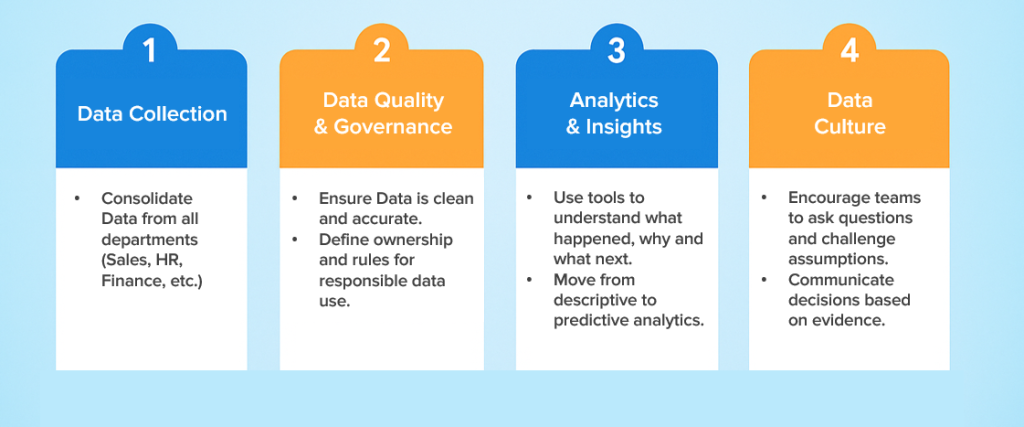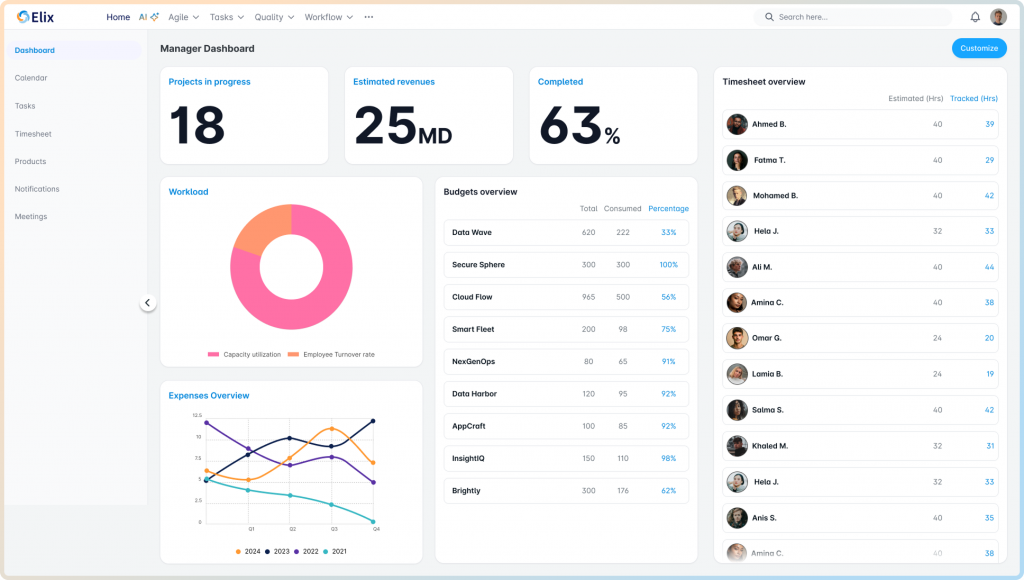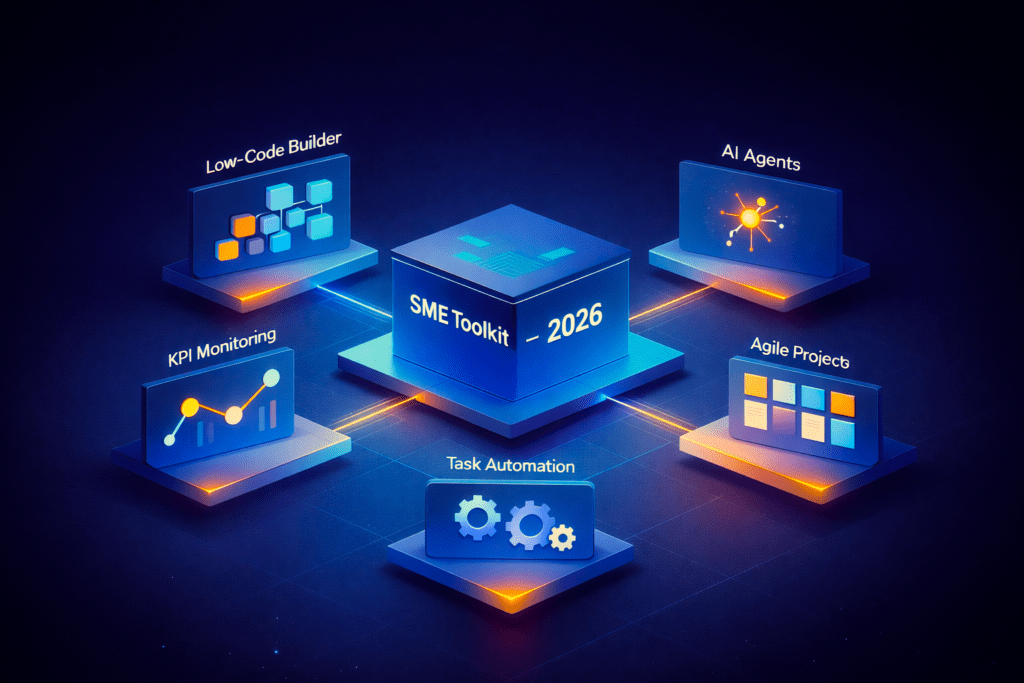How Data-Driven Decision-Making Fuels Business Growth
Blog
·
18/07/2025
·
Are you navigating your company with Clarity or Guesswork?
Imagine steering a ship through fog without a compass. That’s what running a business without data is like. In today’s fast-moving, hyper-connected world, companies can no longer rely on instinct alone. They need clarity, precision, and confidence. That’s where data-driven decision-making comes in.
Instead of guessing what customers want or hoping that a campaign will succeed, businesses today are turning to data (real numbers, patterns, and insights) to guide their moves. This approach is no longer reserved for tech giants; it’s the new standard for any organization that wants to grow and stay competitive.
What does it really mean to be Data-Driven?
At its core, data-driven decision-making means steering your business with facts, not guesswork. Think of it like having a GPS for your company—not a static paper map or outdated instructions, but a live, intelligent system that continuously updates your location, alerts you to traffic jams, and reroutes you around roadblocks. It guides you with precision, adapting instantly to new conditions and opportunities.
Becoming data-driven starts by gathering diverse information such as:
- Sales figures
- Customer behavior
- Website traffic
- Employee performance
- Financial reports
Data collection alone isn’t enough; the power lies in analyzing data and turning insights into action. Key steps include:
- Collecting and integrating data across departments to avoid silos
- Ensuring data quality and governance for accuracy and reliability
- Using analytics tools to understand what happened, why, and predict what’s next
- Fostering a data culture where everyone asks questions, challenges assumptions, and makes evidence-based decisions
Together, these create a dashboard of vital signs—warning lights, speedometers, and fuel gauges—that keep your business healthy and moving forward.

Why do Smart Businesses choose Data Over Intuition?
Reason 1 : Efficiency
With the right data, businesses identify bottlenecks and cut waste. Imagine a restaurant that tracks customer wait times and streamlines kitchen operations accordingly.
Reason 2 : Revenue Growth
Data reveals exactly which products are selling, who’s buying them, and when—helping you spot trends, understand customer preferences, and adjust your marketing and pricing to maximize revenue.
Reason 3 : Customer Satisfaction
Understanding what customers want before they even say it is a game-changer. Data helps personalize experiences, solve problems faster, and build loyalty.
Reason 4 : Competitive Edge
In a crowded market, it sees the whole field before anyone else. Data reveals shifts in customer behavior or market gaps that others miss.
Reason 5 : Risk Mitigation
Think of data as a radar system. It helps spot threats before they hit—whether it’s a dip in performance or a rising cost.
How does Elix help you see what matters?
As data volumes multiply, interpreting and acting on them becomes challenging. This growing complexity creates a clear need for tools that help make data accessible, understandable, and actionable across the organization.
This is where Elix comes in as a modern, modular platform designed to turn data into direction.
Elix is like the central nervous system of your organization. It connects all your internal “organs” (finance, operations, HR, sales, customer service) and lets them communicate through real-time data. The result? A business that thinks and reacts in sync.
Whether you’re running a small team or managing enterprise-wide operations, Elix empowers you with clear dashboards, automated workflows, and integrated KPIs, all tailored to your needs.

1. Elix helps keeping an eye on your most vital Metrics
Key Performance Indicators (KPIs) are the vital signs of a business. Elix monitors them continuously (eg. sales per product, conversion rates, project progress, customer support response times, and more.)
2. Elix makes your Data visible and actionable
With Elix dashboards, you have visual, real-time instruments that help you spot trends, zoom into problem areas, and share insights with your team.
From daily operational dashboards for front-line managers to high-level strategic overviews for executives, Elixadapts to every level of the organization.
- Example: An HR manager notices a spike in sick days among a specific team. Elix flags the trend before it spreads, prompting a check-in with the team lead and a shift in workload.
- Example: A customer success team sees a drop in feature usage from long-term clients. Elix spots the change and notifies the team, allowing proactive outreach before contracts are up for renewal.
- Example: A finance director observes that supplier costs have crept up over the last two quarters. Elix’s trendline visual brings it to light, triggering renegotiations before budget overruns escalate.
- Example: A retail manager notices that one store’s daily sales numbers are strong, but customer satisfaction scores are consistently low. Elix connects the dots, uncovering staff shortages during peak hours.
- Example: A product manager sees that users are frequently abandoning the onboarding process at the same step. Elix highlights the drop-off point, prompting a UX fix that boosts completion rates.
- Example: A CEO receives a dashboard alert showing that operational costs are rising faster than revenue in one business unit. Elix breaks down the root causes, revealing outdated processes that need automating.
- Example: A support lead sees a rise in reopened tickets related to the same issue. Elix automatically clusters these tickets, enabling a quick documentation update and a fix from the product team.
- Example: A sales director sees a high-performing rep’s conversion rate suddenly dip. Elix surfaces this anomaly early, helping the manager uncover a change in lead quality that needs marketing’s attention.
- Example: A logistics manager spots delivery delays in one region. The dashboard highlights it before it affects customer satisfaction scores.
3. Elix turns Insights into Real Business Benefits
Data only becomes valuable when it translates into smarter decisions, and that’s exactly where Elix shines. By combining real-time tracking, visual dashboards, and predictive insights, Elix doesn’t just show you what’s happening. It helps you do something about it.
Let’s break that down with some everyday business scenarios:
Boost Efficiency: Saving hours, reducing friction
No more wasting hours building reports from spreadsheets.
Example: A project manager once spent half a day compiling updates. Now, Elix auto-feeds data into a live dashboard, flagging blockers instantly and enabling rapid action.
➡️ Benefit: Elix automates reporting, centralizes data, and frees time for decision-making—not data wrangling.
Optimize Revenue: Know What Works
Track performance by product, service, or feature in real time.
Example: A SaaS company identified low conversions in a premium plan due to onboarding drop-off. After tweaking the flow, signups rose by 18% in one month.
➡️ Benefit: Elix helps you pinpoint issues and improve offerings, fast.
Customer Satisfaction: Spotting Trouble early
Don’t wait for negative reviews—anticipate them.
Example: Elix revealed slower ticket resolution in one region. The team responded immediately, adjusted staffing, and saw satisfaction scores rebound.
➡️ Benefit: Elix detects early signals so you can protect customer loyalty.
Let Elix take the wheel !
Data-driven decision-making isn’t a trend, it’s a survival skill. Businesses that harness data can see more clearly, act more quickly, and grow more sustainably.
With a platform like Elix, the process becomes seamless. It’s not just about having data; it’s about having the right data, at the right time, in the right hands. Elix turns complex information into simple, actionable insight—like turning headlights on before a long drive at night.
Content
Instead of one central brain, Multi-Agent Systems (MAS) offer a different approach. Intelligence is distributed across multiple autonomous agents that collaborate, adapt, and act in parallel. For business management, this enables faster decisions, higher resilience, and measurable efficiency gains.
By 2026, small and medium-sized enterprises (SMEs) will face a tougher, faster, and more complex business environment than ever before. To stay competitive, SMEs must move away from fragmented tools and rigid software toward flexible, intelligent, and modular platforms. Here are the 5 must-have features that will define the modern SME toolkit in 2026.
In any organization, work can feel like a tangled mess. Tasks are missed, deadlines are a suggestion, and no one is quite sure who's responsible for what. This state of "chaos" isn’t because your team lacks skill or effort. It’s because your internal workflows lack structure. A well-structured workflow management system can transform that chaos into clarity, improving team productivity, business efficiency, and long-term scalability.
Ready to turn your data into impact and actions?


